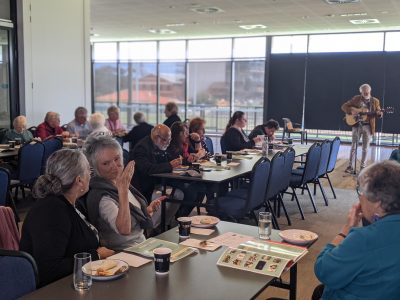Together Again Café



The City of Fremantle is committed towards building on its age-friendly initiatives and fostering a community capacity building approach. This is exemplified through the Together Again Café, which aligns seamlessly into the City’s current Age Friendly City Plan 2019-2024. The project offered an enjoyable monthly morning tea, catering and entertainment in a local accessible venue at no cost to participants. The seeds of the project emerged as a COVID recovery initiative, bringing people together from all walks of life and abilities. The Café mornings delivered on being an inclusive activity, with opportunities being presented to promote inclusion and social participation to a wide cross-section of people attending. It also enabled some older people to share their musical skills in a paid capacity. People who may have been socially isolated had the opportunity to connect with the wider community, lifting spirits and leaving a lasting impact on attendees. The venue was accessible, free parking vouchers were distributed, transport was arranged by service providers picking up people from their homes and taxi voucher were available on request. Evidence showed that most attendees were older people who lived on their own and were potentially socially isolated. Some people came with caregivers and others were brought by their neighbour or family members. The musicians and entertainers were from range of ages which the audience loved and responded to with enthusiasm by joining in singing, clapping, and dancing. The outcomes and achievements from this project directly align with key principles of social participation along with respect and social inclusion. It also delivered on the promotion of sustainable place-based linkages to foster intergeneration cohesion.
Website: https://www.fremantle.wa.gov.au/whats-on/together-again-cafe
Main target group: Vulnerable older people (e.g. at risk or victims of abuse, living alone, poor etc.)
Other target group(s): Young people with disabilities became actively involved.
Sector(s): Other
Other sector(s): Local age care service providers to engage their clients Local volunteers and neighbourhood groups, invited to bring older people who lived in their street.
Desired outcome for older people:
Build and maintain relationships